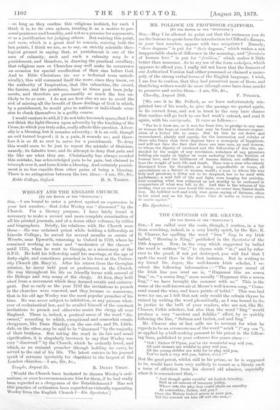WESLEY AND THE ENGLISH ô¯CHURCH.
[TO THE EDIT= OF THE "SPECTATOR:]
am bound to enter a protest against an expression in your last number,ãthat john Wesley was " disowned " by the Church. For a literary purpose, I have lately found it necessary to make a second and more complete examination of all his printed journals, and of a dozen other volumes, by critics and biographers. Briefly, hie relations with the Church were these :ãHe was ordained priest while holding a fellowship at Lincoln College ; he served for several months as curate of Wroote, near Epworth, returning to Oxford in 1729, where he remained working as tutor and "moderator of the classes" until 1736, when he went to Georgia, as a missionary of the S.P.G. He held his fellowship until his marriage, at the age of forty-eight, and sometimes preached in his turn at the Univer- sity Church (St. Mary's). After his return from the Georgian mission, he never held post or preferment in the Church. He was throeghout his life on friendly terms with several of the Bishops and very many of the clergy. At first, they held aloof from a movement which they doomed erratic and extrava- gant. But so early as the year 1747 the invitations to preach in the churches were renewed, and they,bectune so numerous, that in his old age Wesley was the most popular preacher of his time. He was never subject to inhibition, or any process what- ever of ecclesiastical law, and he availed himself of the constant invitations to preach and otherwise assist the clergy all over England. There is, indeed, a poetical sense of the word "dis- owned," according to 7hich, exceptional and somewhat erratic clergymen, like Dean Stanley, on the one side, and Di. Little- dale, on the other, may be said to be "disowned "by the majority of their brethren. But taking the word in its fair and usual signification, it is singularly incorrect to say that Wesley was ever " disowned " by the Church, which he ardently loved, and which, as an eminent preacher (though holding no cure), he served to the end of hie life. The latest entries in his journal speak of sermons (probably for charities) in the largest of the London churches.ãI am, Sir, &c., [Would the Church have hesitated to disown Wesley's ordi- nations, or even to excommunicate him for them, if he had really been regarded as a clergyman of the Establishment P Has not this practice of ordination been regarded as virtually separating Wesley from the English Church PãEn. Spectator.]






























 Previous page
Previous page